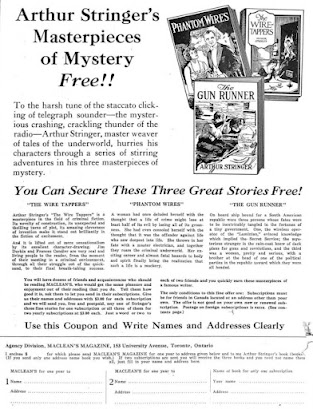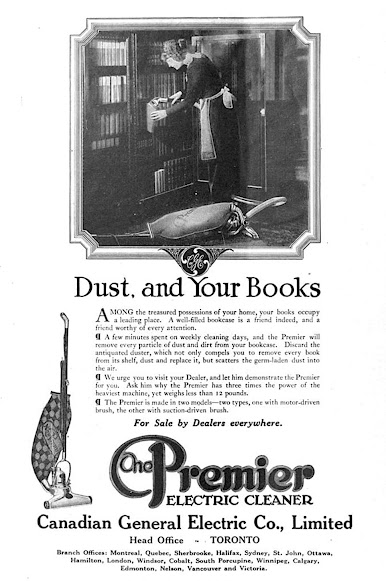Ballads of a Bohemian
Robert W. Service
New York: Barse & Hopkins, 1921
220 pages
It would be interesting to see sales figures for Robert W. Service's books of poetry; my feeling is that each sold fewer copies than the last.
Ballads of a Bohemian, his fifth, followed
Rhymes of a Red Cross Man (1916), which followed
Rhymes of a Rolling Stone (1912), which followed
Ballads of a Cheechako (1909), which followed
Songs of the Sourdough (1907). It wouldn't surprise me to learn that
Songs of the Sourdough –
The Spell of the Yukon to you Yankee readers – accrued more sales than all the others put together.
This is not to suggest that
Ballads of a Bohemian was a commercial failure. Far from it! Ninety-nine years after publication, ninety-nine-year-old copies are thick on the ground. I bought mine two years ago for two dollars. It was read last month, along with Service's forgotten 1926 thriller,
The Master of the Microbe (the subject of next month's
Canadian Notes & Queries column). Both reminded me that when Service left Dawson City for the City of Light, he arrived on the eve of the Great War.
Ballads of a Bohemian is presented as the diary of someone named Stephen Poore, a young American expatriate who, very much like Service, quits secure employment for the life of a versifier. Each entry serves to introduce a Poore poem or two or three. The date of the first – "April 1914" – establishes an ever-hanging, ever-darkening cloud. Poole moves through Montparnasse with the excitement, enthusiasm and optimism of youth, but we people know what's coming.
A few pages in, I began to question whether Stephen Poole can be considered a bohemian. Some cred comes in his claim that he "kicked over an office stool and came to Paris
thinking to make a living by my pen," but there's otherwise nothing at all unconventional about the man. Poole demonstrates remarkable discipline and industry. He lives modestly, has no vices, and knows no women. Poole's acquaintances are limited to "short story man" MacBean and a poet named Saxon Dane. The former is appreciated as a mentor, while the latter is described as dislikable and pretentious: "Originality is his sin," writes Poole:
He strains after it in every line. I must confess I think much of the free verse he writes is
really prose, and a good deal of it blank verse
chopped up into odd lengths. He talks of assonance and color, of stress and pause and accent,
and bewilders me with his theories.
Poole's verse push no boundaries. After presenting "On the Boulevard," the tenth of the sixty-six poems bound between these boards, he brags:
I wrote
this so quickly that I might almost say I had reached the
end before I had come to the beginning. In such a mood
I wonder why everybody does not write poetry. Get a
Roget's Thesaurus, a rhyming dictionary: sit before your
typewriter with a strong glass of coffee at your elbow, and
just click the stuff off.
Poole's verse is conventional, sentimental, romantic, melodramatic, and he knows it:
I have no illusions about myself. I am not fool enough to
think I am a poet, but I have a knack of rhyme and I love
to make verses. Mine is a tootling, tin-whistle music.
Humbly and afar I follow in the footsteps of Praed and
Lampson, of Field and Riley, hoping that in time my Muse
may bring me bread and butter. So far, however, it has
been all kicks and no coppers. And to-night I am at the
end of my tether. I wish I knew where to-morrow’s breakfast was coming from. Well, since rhyming’s been my ruin,
let me rhyme to the bitter end.
Praed? Lampson? Field? Riley? None of those names meant a thing to me. The 1911
Encyclopædia Britannica informs that Winthrop Mackworth Praed was the author of "brilliant rhythmic trifles." The same edition describes Frederick Locker-Lampson as a poet belonging "to the choir who deal with the gay rather than the grave in verse—with the polished and witty rather than the lofty or emotional."
Field is "Michael Field," the pseudonym of Edith Cooper and her aunt, guardian, and lover Katharine Bradley (above), writers of more than two dozen verse dramas.* James Whitcomb Riley, the lone American, was a "poet remembered for nostalgic dialect verse and often called 'the poet of the common people.'"
Encyclopædia Britannica tells me so.
I thank Service for providing an introduction to each. I may just read them one day.
(Am I wrong in being disturbed by the relationship between Edith Cooper and Katharine Bradley?)
Ballads of a Bohemian sold well, reaching #1
Bookseller & Stationer's "Non-Fiction" list. According to
Publishers Weekly, it reached #6 south of the border. Reviews tended toward the positive, if not the laudatory. I've not come across one that addresses the volume's greatest flaw: Service's inability to write as anyone but himself. I can't imagine that readers Service's previous books would detect any difference between the poetry of the Bard of the Yukon and that of his character.
Might I be too hash in suggesting Service incapable? Evidence suggests that he made no effort at all.
Like the Service books that came before,
Ballads of a Bohemian is a haphazard gathering of verse written and published over a period of several years. "The Blood-Red Fourragère" (
Maclean's, April 1918). "The Twa Jocks" (
Maclean's, May 1918), "Kelly of the Legion" (
Maclean's, June 1918), and
"The Wife" (
Maclean's, December, 1918) weren't presented as anything other than Robert W. Service poems. Similarly, verse from the book published after
Ballads of a Bohemian arrived in stores – "Julot the
Apache" (
Cosmopolitan, March 1921), "The Absinthe Drinkers" (
Cosmopolitan, April 1921), "The Death of Marie Toro" (
Cosmopolitan, May 1921) – have no accompanying notes about the Poole character.
Service makes one small effort to separate himself from his character, having Poole write about a poem titled "Lucille":
Well, here’s the thing that has turned the tide for me.
It is somewhat in the vein of “Sourdough” Service, the
Yukon bard. I don’t think much of his stuff, but they
say he makes heaps of money. I can well believe it, for
he drives a Hispano-Suiza in the Bois every afternoon. The
other night he was with a crowd at the Dome Cafe, a chubby
chap who sits in a corner and seldom speaks. I was disappointed. I thought he was a big, hairy man who swore
like a trooper and mixed brandy with his beer. He only
drank Vichy, poor fellow!
Tellingly, this verse "somewhat in the vein of 'Sourdough' Service," is Poole's easiest and most lucrative sale. It begins:
Of course you’ve heard of the Nancy Lee and how
she sailed away
On her famous quest of the Arctic flea, to the wilds
of Hudson’s Bay
For it was a foreign Prince's whim to collect this
tiny cuss,
And a golden quid was no more to him than a
copper to coves like us.
Young children may enjoy.
Ah, I'm being too harsh. Something of a sentimentalist and romantic myself, I was moved by "The Wee Shop," "The Pencil Seller," "The Death of Marie Toro" and, more than any other, "The Auction Sale." "The Coco-Fiend" chilled, but not so much as "It's Later Than You Think." I'd never encountered it in print, but I had heard it... and more than once. But where? These are the best of its seven stanzas:
Look again: yon dainty blonde,
All allure and golden grace,
Oh so willing to respond
Should you turn a smiling face.
Play your part, poor pretty doll;
Feast and frolic, pose and prink;
There’s the Morgue to end it all,
And it’s later than you think.
Yon’s a playwright—mark his face,
Puffed and purple, tense and tired;
Pasha-like, he holds his place,
Hated, envied and admired.
How you gobble life, my friend;
Wine, and woman soft and pink!
Well, each tether has its end:
Sir, it’s later than you think.
See yon living scarecrow pass
With a wild and wolfish stare
At each empty absinthe glass,
As if he saw Heaven there.
Poor damned wretch, to end your pain
There is still the Greater Drink.
Yonder waits the sanguine Seine...
It is later than you think.
Clicking the stuff off is not enough.
Ballads of a Bohemian is a failure for lack of trying, which is not to say that it doesn't have things that may be salvaged. If you read it, you'll find them. The question is whether it's worth your time.
It's later than I think.
 |
| Bookseller & Stationer, November 1921 |
*Correction: Shortly after the above was posted, Daniel H. Grader was kind enough to write, suggesting: "Service's 'Field' can't possibly have been 'Michael Field', whose refined productions have nothing in common with the work of James Whitcomb Riley. Instead, he must have been referring to Eugene Field, the prolific American versifier best remembered as the creator of Wynken, Blynken, and Nod."
I have no doubt that he's correct.
A similar observation was left by reese in the comments.
My thanks to both.
Trivia: In 1921, the year Ballads of a Bohemian was published, Joseph Delmont and Hertha von Walther directed a film titled Julot der Apache. I've yet to find a link between it and "Julot the Apache." On the other hand, I've yet to find so much as a synopsis or still.
Julot seems to reappear in The Master of the Microbe... and then turns out to be someone else entirely. I hope this doesn't serve as a spoiler.
Object and Access: Slim, bound in dark green boards. The frontispiece features a portrait of the poet, looking not the least bit chubby.
Copies are common, but not in our public libraries. The book can be read
here –
gratis – thanks to the Internet Archive. Those preferring paper will find an inexpensive (£3.00) copy of T. Fisher Unwin's first British edition for sale online. At US$139.95, the most expensive copy currently on offer is Barse & Hopkins American first in dust jacket.
Related post:





















































